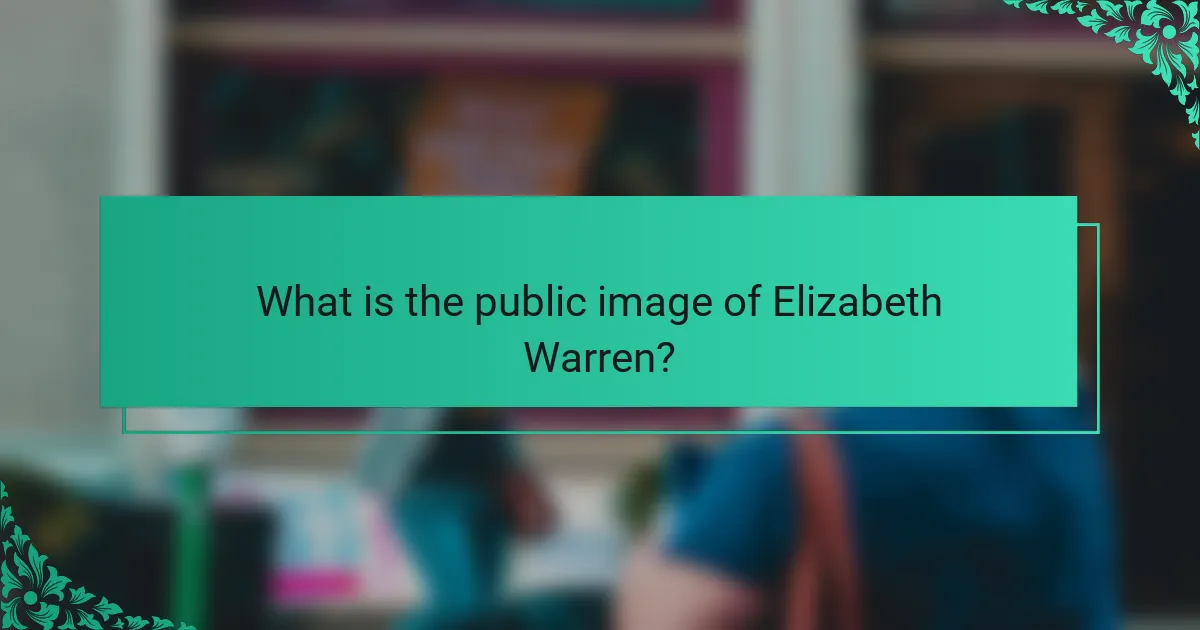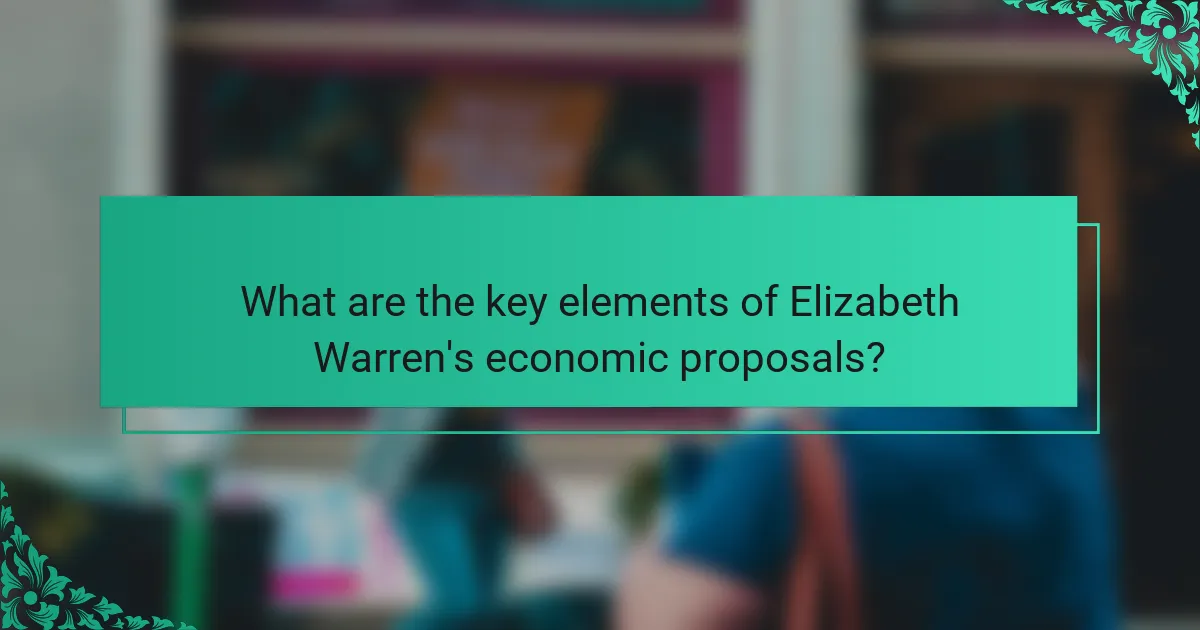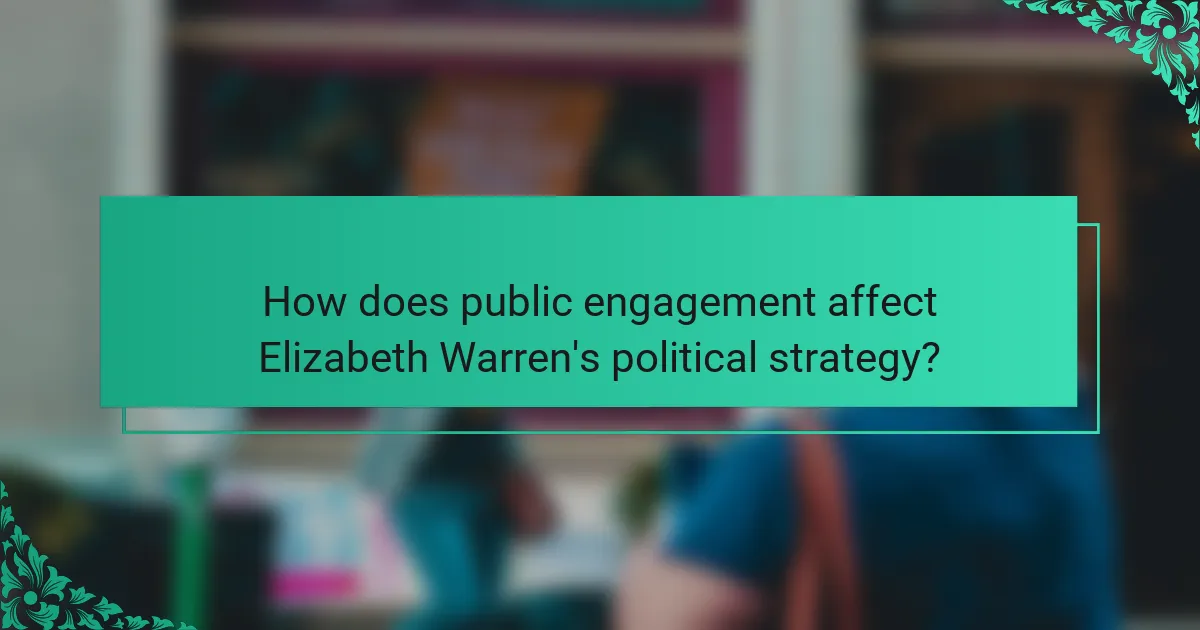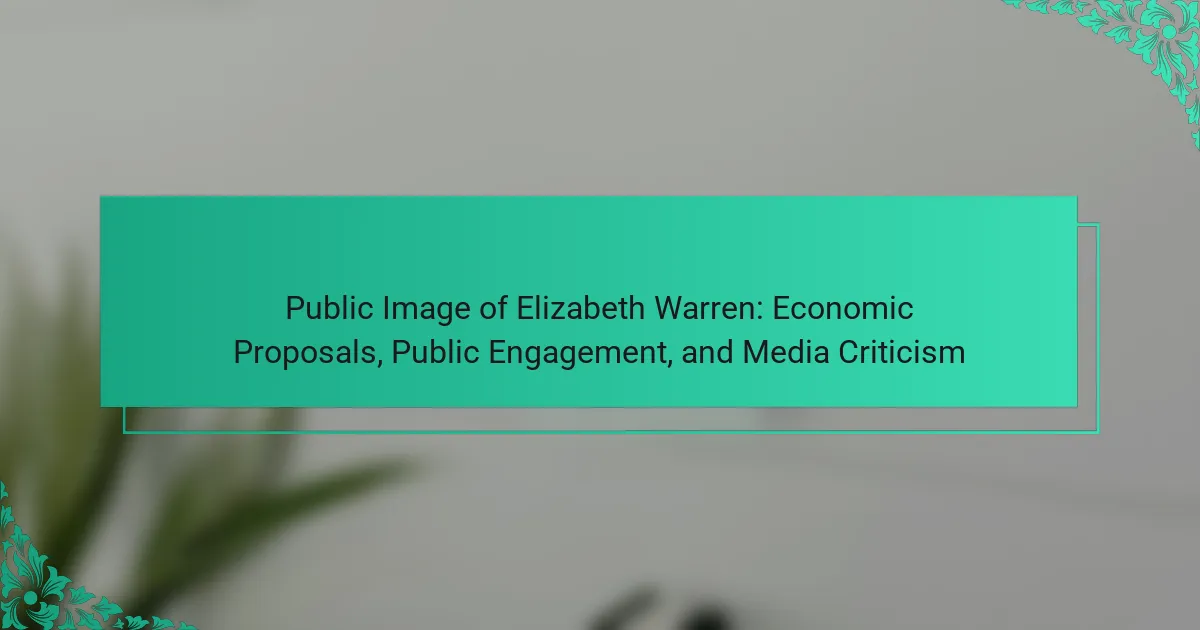Elizabeth Warren is a prominent progressive politician recognized for her focus on economic reform and reducing income inequality. Her key proposals include implementing a wealth tax on the ultra-rich, advocating for student loan forgiveness, and expanding Social Security benefits to support middle-class Americans. Warren’s public engagement strategy, which involves town halls and social media interactions, allows her to connect directly with voters and refine her policies based on their feedback. Despite facing media criticism regarding her claims about her Native American heritage, she maintains a strong public image as an advocate for corporate regulation and consumer protection. This article examines Warren’s economic proposals, her public engagement efforts, and the media controversies that shape her public perception.

What is the public image of Elizabeth Warren?
Elizabeth Warren’s public image is that of a progressive politician focused on economic reform. She is known for advocating for policies aimed at reducing income inequality. Her proposals include wealth taxes and student loan forgiveness. Warren’s background as a law professor adds credibility to her economic arguments. Public engagement through town halls and social media has helped her connect with voters. However, she has faced media criticism, particularly regarding her Native American heritage claims. This controversy has impacted her public perception. Overall, Warren is viewed as a strong advocate for middle-class Americans and corporate regulation.
How do Elizabeth Warren’s economic proposals shape her public image?
Elizabeth Warren’s economic proposals significantly shape her public image by portraying her as a progressive advocate for economic equality. Her plans, such as wealth tax and student loan forgiveness, resonate with voters seeking systemic change. These proposals highlight her commitment to addressing income disparity and corporate regulation. Public perception often aligns her with the fight against corporate greed. Polls indicate that her economic stance appeals to younger voters and working-class individuals. Additionally, her proposals foster a narrative of accountability in government. This narrative enhances her reputation as a champion for the middle class. Overall, her economic policies contribute to a strong, progressive public image.
What specific economic proposals has Elizabeth Warren advocated?
Elizabeth Warren has advocated for several specific economic proposals. She supports a wealth tax on the ultra-rich. This tax aims to impose a two percent annual tax on households with a net worth over $50 million. Warren also proposes universal child care to alleviate financial burdens on families. She advocates for student loan debt cancellation to relieve borrowers. Additionally, Warren promotes increasing the minimum wage to $15 per hour. She has called for stronger regulations on big corporations to ensure fair competition. Warren’s economic proposals focus on reducing income inequality and supporting middle-class families. These proposals are part of her broader agenda for economic reform.
How do these proposals resonate with different demographics?
Elizabeth Warren’s economic proposals resonate variably across different demographics. Younger voters often support her student debt cancellation and tuition-free college initiatives. This demographic values affordable education and economic mobility. Middle-aged voters may appreciate her focus on healthcare reform and worker protections. These issues align with their concerns about job security and family health costs. Older voters might be more skeptical, particularly regarding tax increases to fund her proposals. Research indicates that 60% of voters over 65 express concerns about government spending. Additionally, lower-income individuals generally favor her wealth tax, seeing it as a means to address income inequality. In contrast, higher-income brackets may oppose it, fearing a direct impact on their finances. Overall, demographic differences highlight varying priorities and concerns regarding Warren’s proposals.
What role does public engagement play in Elizabeth Warren’s public perception?
Public engagement significantly enhances Elizabeth Warren’s public perception. It allows her to connect directly with constituents. This connection fosters trust and relatability. Engaging in town halls and social media amplifies her visibility. It showcases her commitment to transparency and accessibility. According to a 2020 survey by Pew Research, 67% of Americans value politicians who engage with the public. This statistic illustrates the positive impact of her engagement efforts. Furthermore, her active participation in discussions on economic issues resonates with her base. Overall, public engagement is crucial in shaping a favorable view of Warren among voters.
How does Elizabeth Warren interact with her constituents?
Elizabeth Warren interacts with her constituents through various channels. She holds town hall meetings to engage directly with the public. These meetings allow her to address concerns and answer questions. Warren also utilizes social media platforms to communicate updates and gather feedback. She frequently shares information on legislative efforts and community issues online. Additionally, she conducts listening tours across Massachusetts. These tours help her understand the needs of her constituents. Warren’s approach emphasizes accessibility and open dialogue. This engagement strategy is designed to foster trust and transparency with the public.
What events and platforms does she utilize for public engagement?
Elizabeth Warren utilizes town halls, community forums, and social media platforms for public engagement. She often hosts town hall meetings to interact directly with constituents. These events allow her to address local issues and gather feedback. Warren also engages with the public through community forums, where she discusses policy proposals. Additionally, she uses social media platforms like Twitter and Facebook to reach a broader audience. These platforms enable her to share updates and respond to constituents in real-time. Warren’s approach combines in-person events and digital engagement to foster communication with the public.
How has media criticism influenced Elizabeth Warren’s public image?
Media criticism has significantly shaped Elizabeth Warren’s public image. Critiques often focus on her economic proposals and authenticity. For example, her “wealth tax” faced scrutiny for its feasibility. This criticism has polarized public perception. Supporters view her as a champion for economic justice. Detractors label her as unrealistic or overly ambitious. Media narratives also highlight her responses to criticism. Warren’s ability to engage with media challenges has reinforced her resilience. Overall, media criticism has both bolstered and hindered her public persona.
What are the main criticisms Elizabeth Warren faces in the media?
Elizabeth Warren faces several main criticisms in the media. One significant criticism is her perceived inconsistency on issues, particularly regarding her claims of Native American heritage. Critics argue this has undermined her credibility. Additionally, her economic proposals, such as wealth tax and student loan forgiveness, are often labeled as unrealistic or overly ambitious. Some media outlets highlight concerns about the feasibility of her plans and their potential economic impact. Warren is also criticized for her combative style in debates and public appearances. This approach sometimes alienates moderate voters. Lastly, her past association with big financial institutions raises questions about her stance on corporate regulation. These criticisms shape her public image and influence media narratives surrounding her political career.
How does she respond to media criticism?
Elizabeth Warren responds to media criticism by addressing it directly through social media and public statements. She often uses platforms like Twitter to clarify her positions and counter misinformation. Warren emphasizes transparency and accountability in her responses. She frequently engages with her supporters to reinforce her message. This approach helps her maintain a strong connection with her base. Warren’s responses often include specific data or examples to support her arguments. She remains focused on her policy proposals while addressing critiques. This strategy allows her to shape the narrative around her public image effectively.

What are the key elements of Elizabeth Warren’s economic proposals?
Elizabeth Warren’s economic proposals focus on wealth redistribution, consumer protection, and corporate regulation. Key elements include a wealth tax on the ultra-rich, which aims to reduce income inequality. Warren advocates for universal child care to support working families. She also proposes student loan debt cancellation to alleviate financial burdens on graduates. Her plans include expanding Social Security benefits to enhance retirement security. Additionally, Warren emphasizes stricter regulations on big corporations to ensure fair competition. These proposals are designed to create a more equitable economy and support the middle class.
What are the foundational principles behind her economic proposals?
The foundational principles behind Elizabeth Warren’s economic proposals include fairness, accountability, and investment in public goods. She advocates for a progressive tax system to reduce income inequality. Warren emphasizes the importance of regulating large corporations to ensure they pay their fair share. Her proposals often focus on expanding access to education and healthcare. She believes these investments can lead to long-term economic growth. Warren’s approach is rooted in the idea that economic policies should benefit the majority, not just the wealthy. Her proposals are designed to empower working families and create a more equitable economy.
How do her proposals aim to address income inequality?
Her proposals aim to address income inequality through progressive taxation and increased access to education. Elizabeth Warren advocates for a wealth tax on ultra-millionaires to redistribute wealth. This tax targets individuals with assets over $50 million, generating significant revenue. The funds would support social programs and investments in public services. Warren also emphasizes affordable education and debt relief for students. By reducing student loan burdens, she aims to create economic opportunities for lower-income individuals. Her proposals include expanding healthcare access to reduce financial strain on families. These strategies collectively seek to level the economic playing field and provide equitable opportunities.
What impact do her proposals have on small businesses?
Her proposals significantly impact small businesses by introducing stricter regulations and increased taxes. These measures aim to promote fair competition and consumer protection. However, many small business owners express concerns about the potential financial burden. For instance, a survey by the National Federation of Independent Business found that 60% of small business owners believe increased taxes would hinder their growth. Additionally, her proposals for higher minimum wages may raise operational costs for small businesses. This could lead to reduced hiring or layoffs, as reported by the U.S. Chamber of Commerce. Overall, while her proposals aim to create a more equitable economy, they may pose challenges for small business sustainability.
How do her proposals compare to those of other political figures?
Elizabeth Warren’s proposals often emphasize wealth redistribution and corporate regulation. Compared to other political figures, her approach is more progressive. For instance, her wealth tax targets ultra-wealthy individuals, which is more aggressive than proposals from moderate politicians. Additionally, her focus on student debt cancellation is more extensive than that of many peers. In contrast, some political figures advocate for more moderate reforms. Warren’s proposals also include detailed plans for healthcare reform, which are often more comprehensive than those of her opponents. This positions her as a leading voice for economic equity within the Democratic Party.
What unique aspects differentiate her proposals from her opponents?
Elizabeth Warren’s proposals are distinguished by their focus on wealth redistribution and consumer protection. She emphasizes a progressive taxation system aimed at the ultra-wealthy. This approach contrasts with her opponents, who often advocate for more moderate fiscal policies. Warren’s plans include specific measures like the “Ultra-Millionaire Tax,” targeting the richest 0.1%. She also prioritizes regulating large corporations to protect consumers and workers. This regulatory focus sets her apart from candidates who favor less government intervention. Additionally, her proposals for student debt cancellation and universal childcare highlight her commitment to middle-class families. These unique aspects reflect her broader vision for economic equity and systemic reform.
How have her proposals evolved over time?
Elizabeth Warren’s proposals have evolved significantly since her early political career. Initially, she focused on consumer protection and financial regulation. Over time, her proposals expanded to include comprehensive healthcare reform and wealth redistribution strategies. For instance, her 2016 campaign emphasized a progressive tax on the wealthy. By 2020, she introduced a detailed plan for universal childcare and student debt cancellation. Each iteration of her proposals reflects a response to changing economic conditions and public sentiment. Her approach has become increasingly bold, advocating for systemic change in the economy. This evolution showcases her adaptability and commitment to addressing economic inequality.

How does public engagement affect Elizabeth Warren’s political strategy?
Public engagement significantly shapes Elizabeth Warren’s political strategy. It allows her to connect directly with constituents and build grassroots support. Engaging with the public helps her refine policy proposals based on real-world feedback. This approach fosters trust and credibility among voters. Warren often utilizes town halls and social media to facilitate dialogue. These platforms enable her to address concerns and highlight her economic proposals. Research shows that candidates who engage effectively tend to have higher voter turnout. Warren’s strategy emphasizes transparency and responsiveness, enhancing her public image.
What strategies does Elizabeth Warren employ for effective public engagement?
Elizabeth Warren employs several strategies for effective public engagement. She utilizes social media platforms to connect directly with constituents. Warren often shares personal stories to illustrate her policy positions. She hosts town hall meetings to encourage community interaction. Warren emphasizes transparency in her communication. She actively responds to questions and concerns from the public. Her campaigns often focus on grassroots organizing to mobilize supporters. Warren also collaborates with local organizations to address specific community needs. These strategies enhance her visibility and foster trust among her audience.
How does she utilize social media to connect with the public?
Elizabeth Warren utilizes social media to engage directly with the public. She shares her policy proposals and personal stories on platforms like Twitter and Instagram. This approach allows her to connect with supporters and respond to their concerns in real-time. Warren often uses social media to mobilize grassroots campaigns and encourage participation in events. She also highlights community issues and amplifies voices often overlooked in traditional media. By leveraging social media, she creates a sense of community among her followers. This strategy has proven effective in building her public image and fostering a loyal support base.
What community initiatives has she led to enhance her public image?
Elizabeth Warren has led various community initiatives to enhance her public image. She has focused on education, advocating for affordable college tuition and student debt relief. Warren launched initiatives supporting small businesses, promoting local economic growth. She has actively participated in community health programs, emphasizing access to healthcare for all. Additionally, Warren has engaged in environmental sustainability efforts, promoting clean energy initiatives. These actions have positioned her as a champion for diverse community needs. Her involvement in these initiatives has garnered positive media coverage, reinforcing her public image as a dedicated public servant.
What lessons can be learned from Elizabeth Warren’s approach to public engagement?
Elizabeth Warren’s approach to public engagement emphasizes authenticity and accessibility. She effectively uses storytelling to connect with her audience. This method allows her to convey complex policy ideas in relatable terms. Warren also engages directly with constituents through town halls and social media. This fosters a sense of community and transparency. Her focus on specific issues, like economic inequality, resonates with many voters. Furthermore, she demonstrates the importance of consistent messaging across platforms. This reinforces her brand and builds trust. Overall, her strategy highlights the value of personal connection in political discourse.
How can other politicians apply her strategies to improve their own public image?
Other politicians can apply Elizabeth Warren’s strategies to improve their public image by focusing on transparency and direct engagement with constituents. They should prioritize clear communication of their economic proposals, similar to Warren’s detailed policy outlines. Engaging in town halls and public forums can foster a sense of connection with voters. Utilizing social media effectively can also enhance visibility and relatability. Consistent messaging that aligns with public concerns is crucial. Research shows that politicians who maintain authenticity and openness tend to build stronger public trust. By adopting these approaches, politicians can create a more positive public perception.
What best practices can be derived from her public engagement efforts?
Best practices from Elizabeth Warren’s public engagement efforts include transparency, authenticity, and active listening. Transparency builds trust with the audience. Warren openly shares her policy positions and personal stories, fostering connection. Authenticity resonates with constituents. Her genuine approach attracts supporters and encourages dialogue. Active listening involves engaging with community concerns. Warren frequently holds town halls and forums to gather feedback. These practices lead to stronger relationships and informed policymaking. They enhance public perception and demonstrate responsiveness to constituents’ needs.
The main entity of this article is Elizabeth Warren, a progressive politician known for her economic reform proposals aimed at reducing income inequality. The article examines her public image, shaped by her advocacy for policies such as wealth taxes and student loan forgiveness, as well as her public engagement strategies through town halls and social media. It also addresses the impact of media criticism on her reputation, particularly regarding her Native American heritage claims. Key sections detail her specific economic proposals, their resonance across different demographics, and the role of public engagement in enhancing her political strategy.
